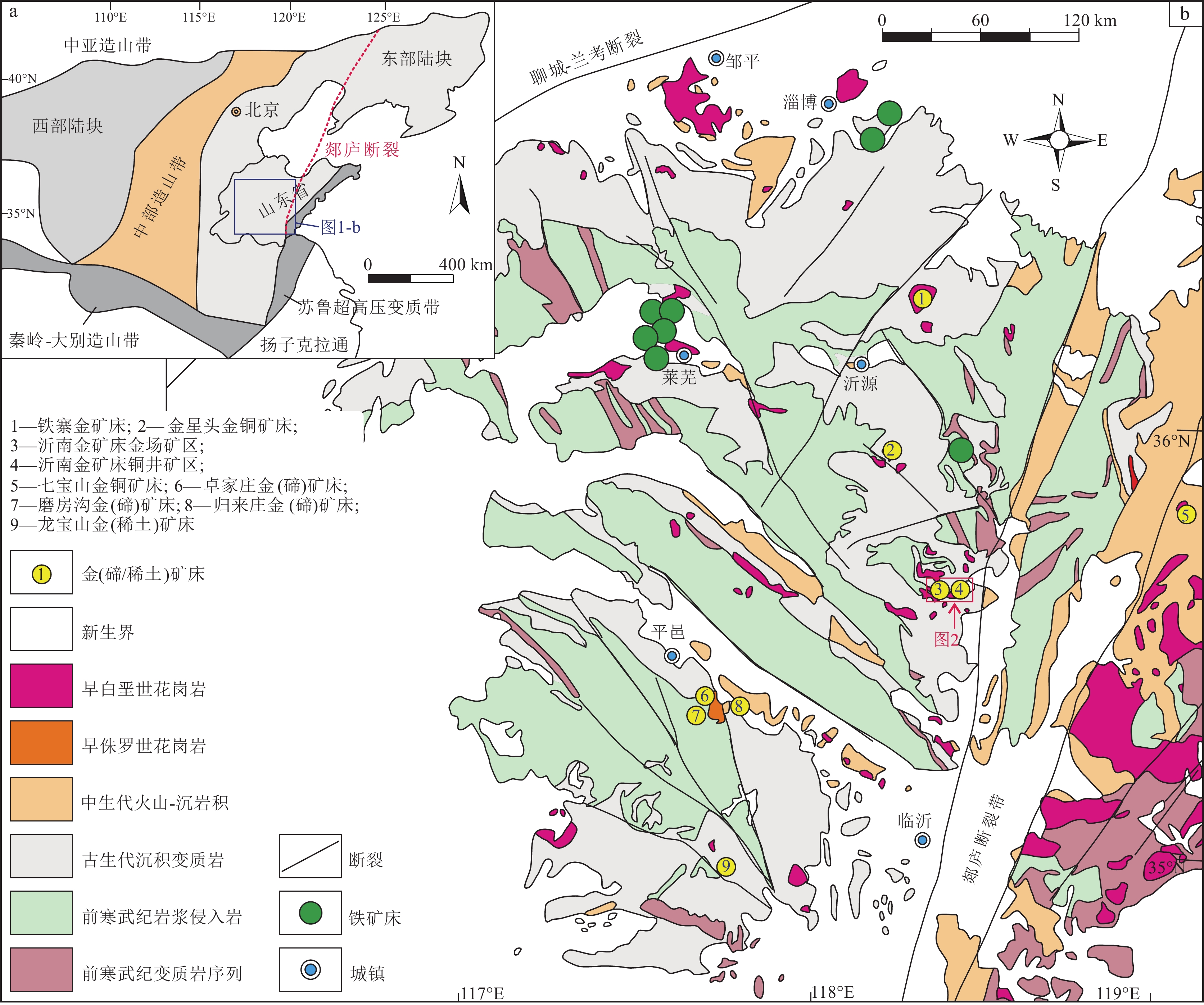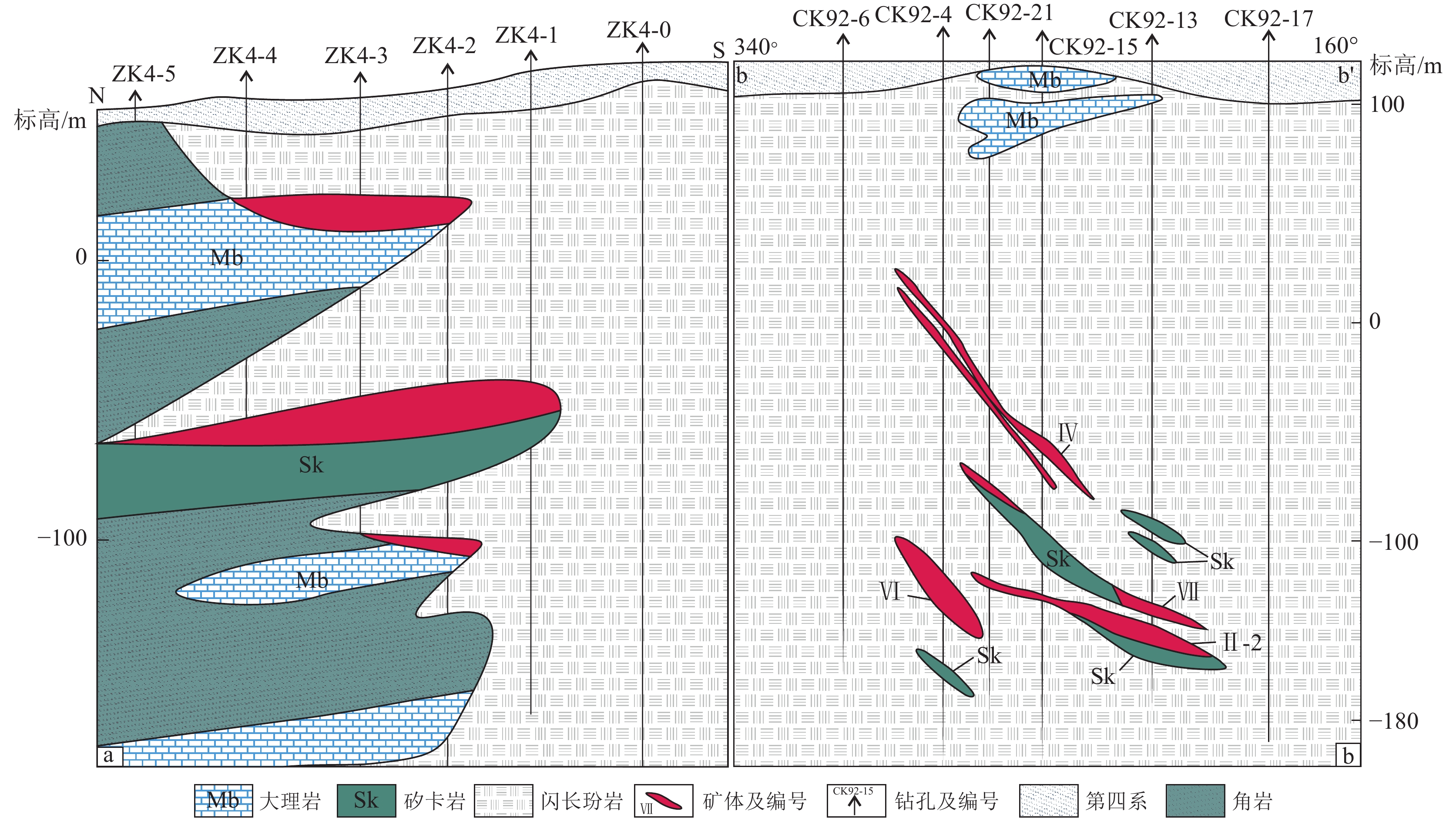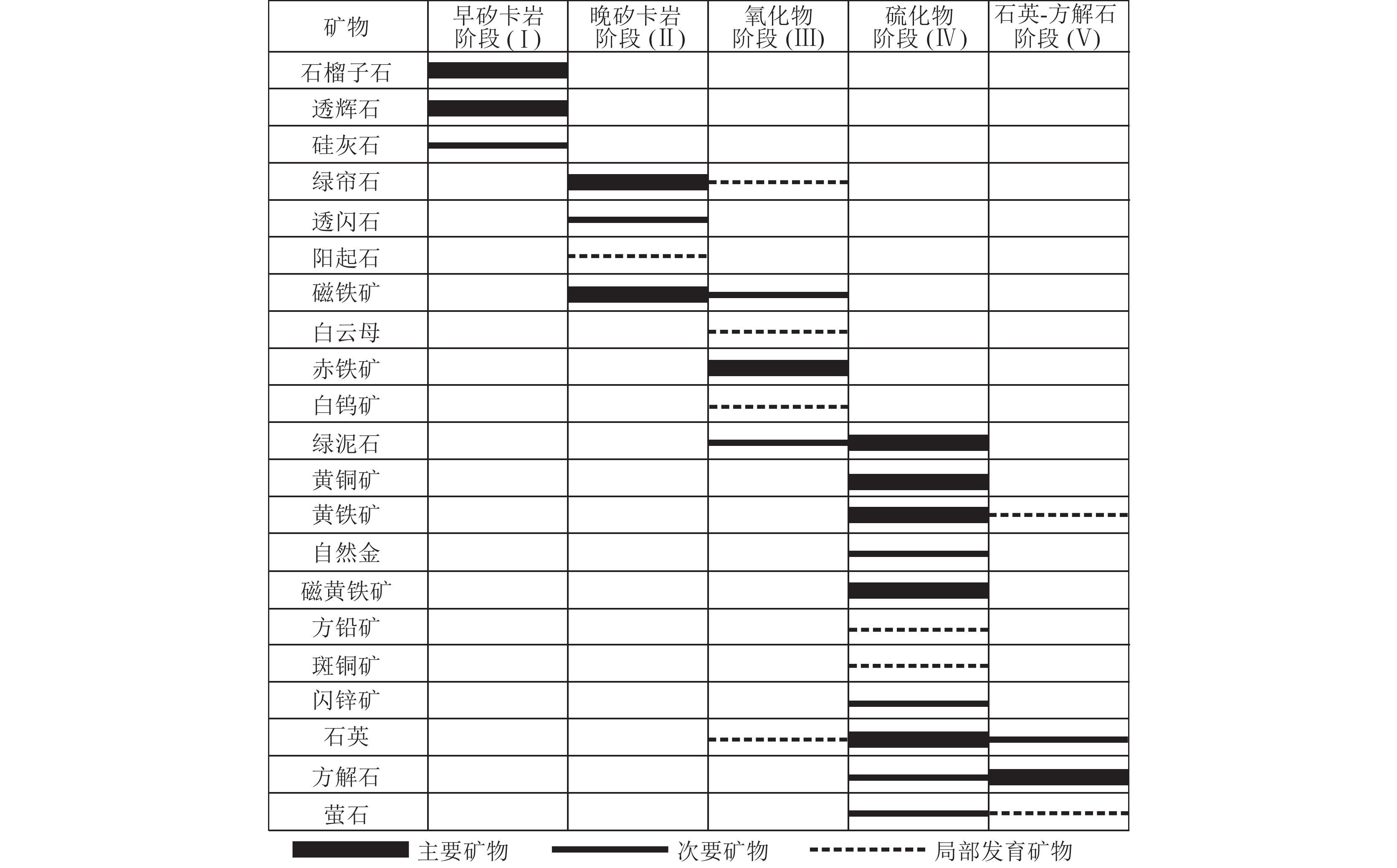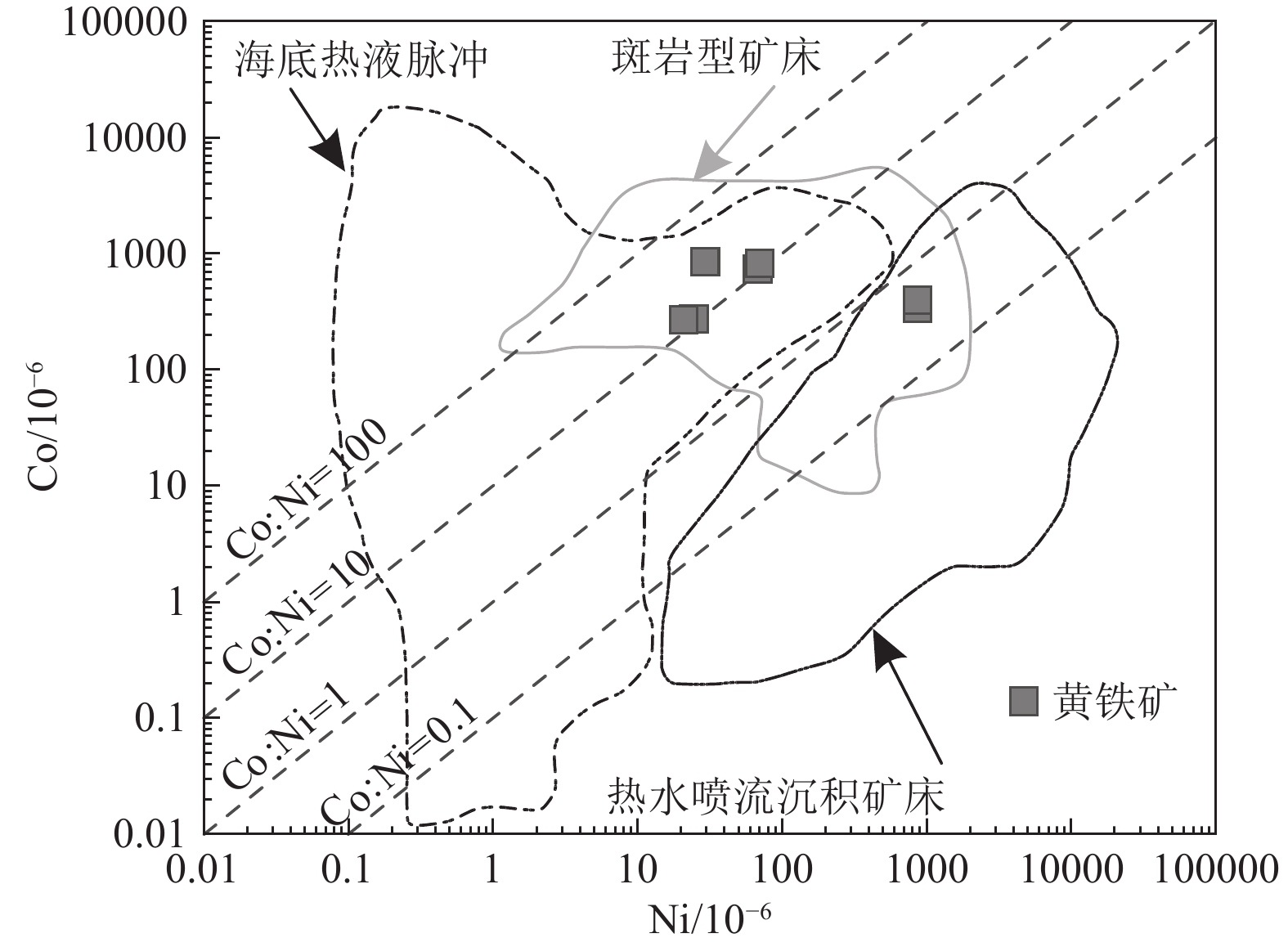Genesis of Yinan gold deposit in Luxi district: Constrain from REE and trace elements of sulfide ore and wall-rock
-
摘要:
沂南金矿床为鲁西地区典型的矽卡岩型矿床,产于早白垩世中酸性杂岩与新太古界—寒武系接触带及其附近。本次利用岩/矿石稀土和微量元素组成,示踪成矿物质来源及成矿流体地球化学性质。结果显示,成矿的闪长玢岩负Eu异常不显著,且早矿化阶段发育大量磁铁矿,暗示早阶段成矿流体具有氧化性特征。晚(金)矿化阶段的黄铁矿和黄铜矿相对富集轻稀土元素和高场强元素,负Eu异常显著,Ce异常不明显,且Hf/Sm、Nb/La值大于1,显示含F−的还原性流体特征。矿石的Y/Ho、Zr/Hf和Nb/Ta值变化较大,且黄铁矿Co/Ni>10,表明成矿流体源于岩浆水和大气降水的混入。矿石与赋矿围岩具有相似的稀土元素配分模式和微量元素地球化学行为,且具有相同范围/趋势的微量元素比值,说明沂南杂岩体和碳酸盐岩提供了必要的成矿物质。综上,沂南金矿床的成矿过程得到了较好的约束,同时也对区域范围内金矿成因有一定指示意义。
Abstract:The Yinan gold deposit is a representative skarn deposit in the Luxi district, mainly produced in and around the contact zone between the Early Cretaceous intermediate−acid complex and the Neoarchean and Cambrian strata. The present work traces the source of ore−forming material and geochemical properties of ore−forming fluids by using rock/ore rare earth and trace element compositions. The ore−forming diorite porphyrite does not show a negative Eu anomaly, and a large amount of magnetite is developed in the early mineralized stage, suggesting that the ore−forming fluid in the early stage is oxidized. Pyrite and chalcopyrite in the late (gold) mineralization stage are relatively enriched in light rare earth elements and high field strength elements, with significant negative Eu anomaly and insignificant Ce anomaly, and Hf/Sm and Nb/La ratios greater than 1, showing the characteristics of F−bearing reductive fluids. The Y/Ho, Zr/Hf and Nb/Ta ratios in the ore are highly variable, and the Co/Ni in the pyrite is more than 10, indicating that the ore−forming fluid originated from the mixing of magmatic water and meteoric water. The ore and the ore−bearing wall rocks have similar rare earth elements partitioning patterns and trace elements geochemical behavior, with the same range/trend of trace element ratios, suggesting that the Yi’nan complex and carbonate rocks provide the necessary ore−forming material. In summary, the mineralization process of the Yi’nan gold deposit has been well constrained, and it also has certain indicative significance for the genesis of gold deposits within the region.
-

-
图 1 华北板块地质简图(a, 据Zhao et al., 2005修改)和鲁西地区地质图及其矽卡岩型铁−金矿床分布(b, 据Deng et al., 2018修改)
Figure 1.
图 2 沂南金矿床金场(a)和铜井矿区(b)地质图(据胡芳芳等,2010,钱建平等,2017;Duan et al., 2020修改)
Figure 2.
图 3 沂南金矿床金场(a)和铜井(b)矿区矿体剖面(据董树义,2008修改)
Figure 3.
图 5 沂南金矿床矿石(a, c)和赋矿围岩(b, d)球粒陨石标准化稀土元素配分模式图解(底图据Boynton, 1984)
Figure 5.
图 6 沂南金矿床矿石(a, c)和赋矿围岩(b,d)原始地幔标准化微量元素蛛网图解(底图据Sun et al., 1989)
Figure 6.
图 7 沂南金矿黄铁矿Ni−Co分布图(Deditius et al., 2013; Cioacă et al., 2014; Keith et al., 2016; Zhang et al., 2016)
Figure 7.
表 1 沂南金矿床矿石及赋矿围岩稀土和微量元素测试样品描述及采样位置
Table 1. Location and characteristics of samples for analysis of REE and trace elements in ores and host rocks in the Yinan gold deposit
序号 样品号 矿区名称 样品类型 采样位置 样品描述 测试矿物/岩石 1 21YNT03 铜井 金铜矿石 汞泉东矿段二中段 黄铁矿、磁铁矿等矿物与角岩呈条带状分布 黄铁矿 2 21YNT12 铜井 金铜矿石 金龙矿段九中段 黄铜矿呈浸染状分布 黄铜矿 3 21YNT15 铜井 金铜矿石 汞泉东矿段二中段 浸染状黄铁矿和黄铜矿矿石,其中黄铁矿晶形较好 黄铁矿 4 21YNT18 铜井 金铜矿石 金龙矿段九中段 黄铁矿−石英脉 黄铁矿 5 21YNT19 铜井 近矿岩体 汞泉东矿段二中段 闪长玢岩 闪长玢岩 6 21YNT20 铜井 赋矿岩体 汞泉东矿段二中段 蚀变闪长玢岩 闪长玢岩 7 21YNT21 铜井 近矿地层 金龙矿段九中段 大理岩 大理岩 8 21YNJ02 金场 金铜矿石 矿石堆 块状矿石(黄铁矿和黄铜矿) 黄铁矿/黄铜矿 9 21YNJ05 金场 金铜矿石 矿石堆 块状矿石(黄铜矿),与少量石英共生 黄铜矿 10 21YNJ06 金场 赋矿岩石 矿石堆 条带状矽卡岩 矽卡岩 11 21YNJ10 金场 赋矿地层 矿石堆 蚀变灰岩 灰岩 表 2 沂南金矿床矿石及赋矿围岩稀土元素含量及特征值
Table 2. REE element abundances and features of ore and host rocks in the Yinan gold deposit
10−6 元素 铜井矿区 21YNT03-1 21YNT03-2 21YNT12-1 21YNT12-2 21YNT15-1 21YNT15-2 21YNT18-1 21YNT18-2 21YNT19-1 21YNT19-2 21YNT20 黄铁矿 黄铁矿 黄铜矿 黄铜矿 黄铁矿 黄铁矿 黄铁矿 黄铁矿 闪长玢岩 闪长玢岩 蚀变闪
长玢岩La 0.390 0.328 0.168 0.280 0.293 0.431 0.195 0.128 30.543 26.498 25.851 Ce 0.785 0.615 0.296 0.355 0.683 0.917 0.425 0.246 48.934 44.735 43.679 Pr 0.099 0.092 0.029 0.034 0.105 0.114 0.050 0.023 5.143 4.865 5.298 Nd 0.452 0.401 0.117 0.103 0.379 0.469 0.171 0.089 19.533 18.362 21.658 Sm 0.077 0.085 0.023 0.018 0.080 0.101 0.021 0.017 3.506 3.261 4.155 Eu 0.017 0.013 0.005 0.005 0.007 0.012 0.007 0.003 1.095 1.096 1.082 Gd 0.107 0.092 0.026 0.024 0.103 0.128 0.041 0.020 3.281 3.171 3.397 Tb 0.020 0.020 0.004 0.006 0.016 0.021 0.006 0.002 0.483 0.475 0.456 Dy 0.101 0.110 0.033 0.013 0.071 0.117 0.035 0.012 2.654 2.585 2.413 Ho 0.027 0.025 0.005 0.005 0.014 0.026 0.008 0.003 0.547 0.532 0.449 Er 0.071 0.078 0.021 0.012 0.047 0.073 0.030 0.014 1.500 1.499 1.207 Tm 0.016 0.010 0.003 0.002 0.006 0.010 0.003 0.001 0.230 0.225 0.178 Yb 0.106 0.093 0.022 0.014 0.047 0.085 0.022 0.013 1.560 1.505 1.079 Lu 0.012 0.010 0.002 0.001 0.008 0.008 0.003 0.001 0.241 0.222 0.150 Y 3.632 3.596 3.172 3.139 3.478 3.641 3.254 3.152 16.101 14.693 13.978 ΣREE 2.280 1.972 0.752 0.873 1.859 2.512 1.019 0.571 119.249 109.032 111.052 LREE 1.820 1.534 0.637 0.795 1.547 2.044 0.869 0.506 108.754 98.817 101.723 HREE 0.460 0.438 0.115 0.077 0.312 0.468 0.150 0.065 10.495 10.215 9.329 LREE/
HREE3.952 3.502 5.541 10.307 4.961 4.367 5.812 7.752 10.362 9.673 10.904 LaN/YbN 2.637 2.531 5.483 14.179 4.480 3.623 6.403 7.322 14.048 12.630 17.178 δEu 0.566 0.434 0.583 0.806 0.238 0.327 0.716 0.458 0.987 1.042 0.880 δCe 0.982 0.867 1.040 0.887 0.953 1.013 1.056 1.101 0.957 0.966 0.915 Gd/Lu 8.796 9.418 11.821 27.071 12.573 16.271 11.941 18.119 13.608 14.258 22.584 La/Sm 5.033 3.844 7.423 15.543 3.669 4.279 9.286 7.637 8.712 8.126 6.221 元素 铜井矿区 金场矿区 21YNT21-1 21YNT21-2 21YNJ02-1 21YNJ02-2 21YNJ02-3 21YNJ02-4 21YNJ05 21YNJ06-1 21YNJ06-2 21YNJ10-1 21YNJ10-2 大理岩 大理岩 黄铁矿 黄铁矿 黄铜矿 黄铜矿 黄铜矿 石榴子石
矽卡岩矽卡岩
化围岩蚀变灰岩 蚀变灰岩 La 3.164 3.006 0.202 0.230 0.135 0.137 0.269 45.158 2.734 2.259 2.016 Ce 5.791 5.104 0.457 0.481 0.200 0.208 0.388 63.569 13.887 3.701 3.381 Pr 0.822 0.753 0.072 0.075 0.026 0.024 0.083 6.437 3.557 0.495 0.478 Nd 3.328 2.931 0.316 0.371 0.076 0.108 0.406 21.335 18.114 1.879 1.818 Sm 0.676 0.616 0.115 0.114 0.010 0.024 0.128 3.986 3.758 0.327 0.317 Eu 0.152 0.129 0.013 0.015 0.003 0.003 0.015 0.743 1.118 0.061 0.059 Gd 0.725 0.658 0.163 0.143 0.029 0.035 0.190 3.680 3.106 0.300 0.306 Tb 0.117 0.113 0.034 0.033 0.004 0.006 0.037 0.624 0.466 0.043 0.044 Dy 0.707 0.715 0.211 0.225 0.018 0.035 0.214 3.599 2.484 0.204 0.263 Ho 0.159 0.144 0.043 0.052 0.004 0.009 0.053 0.788 0.524 0.044 0.049 Er 0.495 0.447 0.134 0.144 0.019 0.024 0.151 2.283 1.403 0.113 0.140 Tm 0.082 0.073 0.023 0.022 0.001 0.005 0.023 0.337 0.219 0.015 0.016 Yb 0.496 0.455 0.150 0.168 0.018 0.029 0.155 2.285 1.463 0.104 0.110 Lu 0.077 0.071 0.018 0.020 0.002 0.004 0.020 0.341 0.201 0.013 0.018 Y 7.078 6.729 3.873 3.873 3.140 3.217 3.825 19.476 15.547 4.559 4.658 ΣREE 16.792 15.215 1.952 2.091 0.546 0.651 2.131 155.165 53.036 9.558 9.014 LREE 13.933 12.539 1.175 1.284 0.450 0.504 1.288 141.228 43.169 8.722 8.068 HREE 2.858 2.677 0.777 0.807 0.096 0.147 0.843 13.937 9.867 0.836 0.946 LREE/
HREE4.875 4.684 1.512 1.592 4.693 3.418 1.527 10.133 4.375 10.436 8.525 LaN/YbN 4.576 4.738 0.965 0.983 5.264 3.351 1.243 14.177 1.341 15.615 13.105 δEu 0.662 0.618 0.283 0.352 0.529 0.282 0.300 0.593 1.000 0.594 0.577 δCe 0.881 0.832 0.930 0.898 0.828 0.889 0.640 0.914 1.092 0.858 0.845 Gd/Lu 9.381 9.295 8.842 7.149 12.768 7.733 9.564 10.800 15.426 23.236 17.078 La/Sm 4.677 4.876 1.761 2.019 13.837 5.716 2.102 11.329 0.728 6.898 6.364 表 3 沂南金矿床矿石及赋矿围岩微量元素含量及特征值
Table 3. Trace element abundances and features of the ore and host rocks in the Yinan gold deposit
10−6 元素 铜井矿区 21YNT03-1 21YNT03-2 21YNT12-1 21YNT12-2 21YNT15-1 21YNT15-2 21YNT18-1 21YNT18-2 21YNT19-1 21YNT19-2 21YNT20 黄铁矿 黄铁矿 黄铜矿 黄铜矿 黄铁矿 黄铁矿 黄铁矿 黄铁矿 闪长玢岩 闪长玢岩 弱蚀变闪长玢岩 Cs 0.052 0.040 0.036 0.029 0.038 0.054 0.043 0.025 2.699 2.378 6.814 Rb 0.765 0.527 0.269 0.194 0.742 0.902 0.345 0.191 40.075 33.483 40.192 Ba 5.833 5.081 4.123 5.040 2.706 3.642 4.802 3.743 759.568 781.208 157.542 Th 0.265 0.484 0.170 0.095 0.119 0.256 0.167 0.101 3.324 3.218 3.258 U 0.134 0.136 0.052 0.056 0.200 0.400 0.045 0.053 1.204 1.107 1.373 Nb 8.638 13.925 0.518 1.612 3.034 0.487 2.468 1.903 6.299 6.546 8.452 Ta 3.859 4.381 0.412 0.519 0.928 0.303 1.655 1.006 1.126 0.945 3.136 La 0.390 0.328 0.168 0.280 0.293 0.431 0.195 0.128 30.543 26.498 25.851 Ce 0.785 0.615 0.296 0.355 0.683 0.917 0.425 0.246 48.934 44.735 43.679 Sr 4.400 4.100 3.900 4.800 5.271 5.344 3.382 3.718 517.660 484.070 434.540 Nd 0.452 0.402 0.117 0.103 0.379 0.469 0.171 0.089 19.533 18.362 21.658 P 19.290 16.560 4257.000 4136.000 60.090 63.600 19.780 30.030 758.900 757.500 783.900 Zr 23.845 20.143 11.954 12.705 12.670 14.707 12.462 11.930 265.360 242.770 294.750 Hf 0.407 0.381 0.091 0.167 0.097 0.185 0.126 0.093 5.909 5.737 5.912 Sm 0.077 0.085 0.023 0.018 0.080 0.101 0.021 0.017 3.506 3.261 4.155 Eu 0.017 0.013 0.005 0.006 0.007 0.012 0.007 0.003 1.095 1.096 1.082 Ti 274.700 303.800 120.700 251.400 106.800 131.600 104.900 87.880 3424.000 3411.000 3594.000 Gd 0.107 0.092 0.026 0.024 0.103 0.128 0.041 0.020 3.281 3.171 3.397 Tb 0.020 0.020 0.004 0.006 0.016 0.021 0.006 0.002 0.483 0.475 0.456 Y 3.632 3.596 3.172 3.139 3.479 3.641 3.254 3.152 16.101 14.693 13.978 Yb 0.106 0.093 0.022 0.014 0.047 0.085 0.022 0.013 1.560 1.505 1.080 Lu 0.012 0.010 0.002 0.001 0.008 0.008 0.004 0.001 0.241 0.222 0.150 Ho 0.027 0.025 0.005 0.005 0.014 0.026 0.008 0.003 0.547 0.532 0.449 Co 855.316 852.567 446.198 402.098 341.004 396.511 737.108 818.595 23.530 22.717 12.297 Ni 29.413 29.074 279.981 255.028 862.713 864.136 67.802 70.083 99.635 96.307 43.276 Hf/Sm 5.255 4.475 4.027 9.256 1.221 1.843 6.000 5.518 1.685 1.759 1.423 Th/La 0.680 1.477 1.011 0.341 0.408 0.595 0.856 0.786 0.109 0.121 0.126 Nb/La 22.167 42.519 3.091 5.759 10.363 1.131 12.669 14.832 0.206 0.247 0.327 Y/Ho 136.029 144.088 600.149 672.711 256.691 140.229 383.070 1040.937 29.447 27.593 31.155 Co/Ni 29.079 29.324 1.594 1.577 0.395 0.459 10.872 11.680 0.236 0.236 0.284 Nb/Ta 2.239 3.179 1.258 3.104 3.271 1.607 1.491 1.891 5.595 6.926 2.695 Zr/Hf 58.630 52.827 131.363 76.261 130.082 79.326 98.905 128.695 44.909 42.315 49.857 Th/U 1.973 3.550 3.235 1.713 0.597 0.641 3.696 1.890 2.761 2.907 2.373 La/Sm 5.035 3.844 7.416 15.544 3.669 4.279 9.276 7.637 8.712 8.126 6.221 Gd/Lu 8.810 9.408 11.773 26.667 12.573 16.228 11.829 17.727 13.608 14.258 22.588 (La/Sm)/
(Gd/Lu)0.572 0.409 0.630 0.583 0.292 0.264 0.784 0.431 0.640 0.570 0.275 续表 3 元素 铜井矿区 金场矿区 大理岩 大理岩 黄铁矿 黄铁矿 黄铜矿 黄铜矿 黄铜矿 石榴子石 矽卡岩
化围岩蚀变灰岩 蚀变灰岩 21YNT21-1 21YNT21-2 21YNJ02-1 21YNJ02-2 21YNJ02-3 21YNJ02-4 21YNJ05 21YNJ06-1 21YNJ06-2 21YNJ10-1 21YNJ10-2 Cs 0.159 0.047 0.045 0.067 0.020 0.027 0.043 6.485 0.188 0.809 0.700 Rb 1.919 0.593 1.485 1.867 0.314 0.626 0.999 99.921 5.090 3.377 2.862 Ba 20.649 14.398 3.168 2.656 4.294 2.638 3.104 104.114 11.261 7.953 7.463 Th 0.258 0.208 0.281 0.331 0.071 0.141 0.187 13.819 2.236 0.303 0.392 U 0.160 0.120 3.822 3.890 0.228 0.989 3.224 13.442 5.685 0.590 0.896 Nb 7.665 7.113 0.578 0.449 0.551 5.168 3.152 37.001 12.746 0.923 18.766 Ta 2.782 1.736 0.387 0.474 0.561 2.329 1.799 4.849 2.052 0.340 5.246 La 3.164 3.006 0.202 0.230 0.135 0.137 0.269 45.158 2.734 2.259 2.016 Ce 5.792 5.104 0.457 0.481 0.200 0.208 0.388 63.569 13.887 3.701 3.381 Sr 196.080 176.800 3.564 3.553 3.269 3.242 3.743 312.007 21.879 94.896 91.400 Nd 3.328 2.931 0.316 0.371 0.076 0.108 0.406 21.335 18.114 1.879 1.818 P 60.570 23.980 30.520 50.230 4397.000 4346.000 4237.000 679.700 161.600 8.070 56.280 Zr 45.961 51.470 12.244 13.433 10.307 12.148 11.373 405.413 77.616 18.761 18.676 Hf 1.118 1.271 0.107 0.170 0.070 0.111 0.098 10.182 1.895 0.296 0.312 Sm 0.676 0.616 0.115 0.114 0.010 0.024 0.128 3.986 3.758 0.327 0.317 Eu 0.152 0.129 0.013 0.015 0.003 0.003 0.015 0.743 1.118 0.061 0.059 Ti 759.200 847.900 97.460 124.900 88.170 122.200 95.110 5746.000 1072.000 141.800 202.600 Gd 0.725 0.658 0.163 0.143 0.029 0.035 0.190 3.680 3.106 0.300 0.306 Tb 0.117 0.113 0.034 0.033 0.004 0.006 0.037 0.624 0.466 0.043 0.044 Y 7.078 6.729 3.873 3.873 3.140 3.217 3.825 19.476 15.547 4.559 4.658 Yb 0.496 0.455 0.150 0.168 0.018 0.029 0.155 2.285 1.463 0.104 0.110 Lu 0.077 0.071 0.018 0.020 0.002 0.004 0.020 0.341 0.201 0.013 0.018 Ho 0.159 0.144 0.043 0.052 0.004 0.009 0.053 0.788 0.524 0.044 0.049 Co 4.361 4.807 272.699 269.554 15.153 14.485 58.531 9.604 2.675 0.702 2.619 Ni 7.176 6.543 24.527 20.737 6.424 6.284 71.469 28.044 5.965 4.594 4.174 Hf/Sm 1.653 2.062 0.929 1.495 7.179 4.638 0.764 2.554 0.504 0.903 0.984 Th/La 0.081 0.069 1.386 1.443 0.526 1.028 0.698 0.306 0.818 0.134 0.195 Nb/La 2.423 2.366 2.857 1.957 4.069 37.637 11.737 0.819 4.661 0.409 9.310 Y/Ho 44.424 46.652 89.374 75.208 827.246 342.018 71.906 24.720 29.646 102.442 95.387 Co/Ni 0.608 0.735 11.118 12.999 2.359 2.305 0.819 0.342 0.449 0.153 0.627 Nb/Ta 2.756 4.096 1.496 0.949 0.983 2.219 1.753 7.630 6.212 2.713 3.577 Zr/Hf 41.106 40.496 114.604 79.013 146.612 109.028 116.489 39.817 40.964 63.426 59.898 Th/U 1.610 1.738 0.073 0.085 0.313 0.143 0.058 1.028 0.393 0.514 0.438 La/Sm 4.677 4.876 1.761 2.019 13.837 5.716 2.102 11.329 0.728 6.898 6.364 Gd/Lu 9.382 9.291 8.842 7.149 12.768 7.733 9.564 10.800 15.426 23.236 17.078 (La/Sm)/(Gd/Lu) 0.499 0.525 0.199 0.282 1.084 0.739 0.220 1.049 0.047 0.297 0.373 -
[1] Anenburg M, Mavrogenes J A, Frigo C, et al. 2020. Rare earth element mobility in and around carbonatites controlled by sodium, potassium, and silica[J]. Science Advances, 41(6): 2375−2548.
[2] Ayers J C, Watson E B. 1993. Apatite/fluid partitioning of rare–earth elements and strontium: Experimental results at 1.0 GPa and 1000℃ and application to models of fluid–rock interaction[J]. Chemical Geology, 110: 299−314. doi: 10.1016/0009-2541(93)90259-L
[3] Bajwah Z U, Seccombe P K, Offler R. 1987. Trace element distribution Co: Ni ratios and genesis of the Big Cadia iron–copper deposit, New South Wales, Australia[J]. Mineralium Deposita, 22: 292−300.
[4] Bau M, Dulski P. 1995. Comparative study of yttrium and rare–earth element behaviors in fluorine–rich hydrothermal fluids[J]. Contributions to Mineralogy and Petrology, 119(2/3): 213−223. doi: 10.1007/BF00307282
[5] Boynton W V. 1984. Geochemistry of the rare earth elements: Meteorite studies[M]. Amsterdam: Elsevier: 63–114.
[6] Bralia A, Sabatini G, Troja F. 1979. A revaluation of the Co/Ni ration in pyrite as geochemical tool in ore genesis problems[J]. Mineralium Deposita, 14: 353−374.
[7] Cai W Y, Zhang Z L, Liu X, et al. 2023a. Metallogeny of the Yi’nan Tongjing Au–Cu skarn deposit, Luxi district, North China Craton: Perspective from in–suit trace elements, sulfur and lead isotopes of sulfides[J]. Frontiers in Earth Science, 10: 1084212. doi: 10.3389/feart.2022.1084212
[8] Cai W Y, Liu X, Zhang Z L, et al. 2023b. Genesis of the Yi’nan Tongjing Gold–Copper Skarn Deposit, Luxi District, North China Craton: Evidence from Fluid Inclusions and H–O Isotopes[J]. Minerals, 13: 1348.
[9] Campbell F A, Ethier V G. 1984. Nickel and cobalt in pyrrhotite and pyrite from the Faro and Sullivan orebodies[J]. Canadian Mineralogist, 22: 503−506.
[10] Chen L, Tao W, Zhao L, et al. 2008. Distinct lateral variation of lithospheric thickness in the Northeastern North China Craton[J]. Earth and Planetary Science Letters, 267: 56−68. doi: 10.1016/j.jpgl.2007.11.024
[11] Cioacă M E, Munteanu M, Qi L, et al. 2014. Trace element concentrations in porphyry copper deposits from Metaliferi Mountains, Romania: a reconnaissance study[J]. Ore Geology Reviews, 63: 22−39. doi: 10.1016/j.oregeorev.2014.04.016
[12] Deditius A, Chryssoulis S, Li J W, et al. 2013. Pyrite as a record of hydrothermal fluid evolution in a porphyry copper system: a SIMS/EMPA trace element study[J]. Geochimica et Cosmochimica Acta, 104: 42−62. doi: 10.1016/j.gca.2012.11.006
[13] Deng J, Wang C, Bagas L, et al. 2018. Crustal architecture and metallogenesis in the south–eastern North China Craton[J]. Earth Science Reviews, 182: 251−272. doi: 10.1016/j.earscirev.2018.05.001
[14] Duan Z, Li J W. 2017. Zircon and titanite U–Pb dating of the Zhangjiawa iron skarn deposit, Luxi district, North China Craton: Implications for a craton–wide iron skarn mineralization[J]. Ore Geology Reviews, 89: 309−323. doi: 10.1016/j.oregeorev.2017.06.022
[15] Duan Z, Gleeson S A, Gao W S, et al. 2020. Garnet U–Pb dating of the Yinan Au–Cu skarn deposit, Luxi District, North China Craton: Implications for district–wide coeval Au–Cu and Fe skarn mineralization[J]. Ore Geology Reviews, 118: 103310. doi: 10.1016/j.oregeorev.2020.103310
[16] George L L, Cristian B, Massimo D, et al. 2018. Textural and trace element evolution of pyrite during greenschist facies metamorphic recrystallization in the southern Apuan Alps (Tuscany, Italy): influence on the formation of Tl–rich sulfosalt melt[J]. Ore Geology Reviews, 102: 59−105. doi: 10.1016/j.oregeorev.2018.08.032
[17] Gregory D D, Large R R, Halpin J A, et al. 2015. Trace element content of sedimentary pyrite in Black Shales[J]. Economic Geology, 110: 1389−1410. doi: 10.2113/econgeo.110.6.1389
[18] Guo P, Santosh M, Li S R. 2013. Geodynamics of gold metallogeny in the Shandong Province, NE China: an integrated geological, geophysical and geochemical perspective[J]. Gondwana Research, 24: 1172−1202. doi: 10.1016/j.gr.2013.02.004
[19] Guo P, Santosh M, Li S R, et al. 2014. Crustal evolution in the central part of Eastern NCC: Zircon U–Pb ages from multiple magmatic pulses in the Luxi area and implications for gold mineralization[J]. Ore Geology Reviews, 60: 126−145. doi: 10.1016/j.oregeorev.2014.01.002
[20] Hayashi K I, Ohmoto H. 1991. Solubility of gold in NaCl– and H2S–bearing aqueous solutions at 250–350 °C[J]. Geochimica et Cosmochimica Acta, 55: 2111–2126.
[21] Hu H B, Mao J W, Niu S Y, et al. 2006. Geology and geochemistry of telluridebearing Au deposits in the Pingyi area, western Shandong, China[J]. Mineralogy and Petrology, 87: 209−240. doi: 10.1007/s00710-006-0126-8
[22] Jenner F E, O'Neill H S C, Arculus R J, et al. 2010. The magnetite crisis in the evolution of arc–related magmas and the initial concentration of Au, Ag and Cu[J]. Journal of Petrology, 12: 2445−2464.
[23] Keith M, Haase K M, Klemd R, et al. 2016. Systematic variations of trace element and sulfur isotope compositions in pyrite with stratigraphic depth in the Skouriotissa volcanic–hosted massive sulfide deposit, Troodos ophiolite, Cyprus[J]. Chemical Geology, 423: 7−18. doi: 10.1016/j.chemgeo.2015.12.012
[24] Keppler H. 1996. Constraints from partitioning experiments on the composition of subduction zone fluids[J]. Nature, 380: 237−240. doi: 10.1038/380237a0
[25] Koglin N, Frimmel H E, Minter W L, et al. 2010. Trace–element characteristics of different pyrite types in Mesoarchaean to Palaeoproterozoic placer deposits[J]. Mineralium Deposita, 45: 259−280. doi: 10.1007/s00126-009-0272-0
[26] Lan T G, Fan H R, Santosh M, et al. 2012. Early Jurassic high–K calc–alkaline and shoshonitic rocks from the Tongshi intrusive complex, eastern North China Craton: Implication for crust–mantle interaction and post–collisional magmatism[J]. Lithos, 140: 183−199.
[27] Large R R, Halpin J A, Danyushevsky L V, et al. 2014. Trace element content of sedimentary pyrite as a new proxy for deep–time ocean–atmosphere evolution[J]. Earth and Planetary Science Letters, 389: 209−220. doi: 10.1016/j.jpgl.2013.12.020
[28] Li J, Cai W Y, Li B, et al. 2019. Paleoproterozoic SEDEX–type stratiform mineralization overprinted by Mesozoic vein–type mineralization in the Qingchengzi Pb–Zn deposit, Northeastern China[J]. Journal of Asian Earth Sciences, 184: 104009. doi: 10.1016/j.jseaes.2019.104009
[29] Li J, Wang K Y, Cai W Y, et al. 2020. Triassic gold–silver metallogenesis in Qingchengzi orefield, North China Craton: Perspective from fluid inclusions, REE and H–O–S–Pb isotope systematics[J]. Ore Geology Reviews, 121: 103567. doi: 10.1016/j.oregeorev.2020.103567
[30] Liu Y S, Zong K Q, Kelemen P B, et al. 2008. Geochemistry and magmatic history of eclogites and ultramafic rocks from the Chinese continental scientific drill hole: Subduction and ultrahigh–pressure metamorphism of lower crustal cumulates[J]. Chemical Geology, 247(1/2): 133−153. doi: 10.1016/j.chemgeo.2007.10.016
[31] Liu Y, Santosh M, Li S R, et al. 2014. Stable isotope geochemistry and Re–Os ages of the Yi’nan gold deposit, Shandong Province, northeastern China[J]. International Geology Review, 6: 695−710.
[32] Mao G Z, Hua R M, Gao J F, et al. 2009. Existing forms of REE in gold–bearing pyrite of the Jinshan gold deposit, Jiangxi Province, China[J]. Journal of Rare Earths, 27(6): 1079−1087. doi: 10.1016/S1002-0721(08)60392-0
[33] Maslennikov V V, Maslennikova S P, Large R R, et al. 2009. Study of trace element zonationin vent chimneys from the Silurian Yaman–Kasy volcanic–hosted massive sulfide deposit (Southern Urals, Russia) using laser ablation–inductively coupled plasma mass spectrometry(LA–ICPMS)[J]. Economic Geology, 104: 1111−1141. doi: 10.2113/gsecongeo.104.8.1111
[34] Meng Y M, Hu R Z, Huang X W, et al. 2018. The relationship between stratabound Pb–Zn–Ag and porphyry–skarn Mo mineralization in the Laochang deposit, southwestern China: constraints from pyrite Re–Os isotope, sulfur isotope, and trace element data[J]. Journal of Geochemical Exploration, 194: 218−238. doi: 10.1016/j.gexplo.2018.08.008
[35] Mills R, Elderfield H. 1995. Rare earth element geochemistry of hydrothermal deposits from the active TAG Mount, 26°N mid–Atlantic Ridge[J]. Geochimica et Cosmochimica Acta, 59(17): 3511−3524. doi: 10.1016/0016-7037(95)00224-N
[36] Oreskes N, Einaudi M T. 1990. Origin of rare earth element–enriched hematite breccias at the Olympic Dam Cu–U–Au–Ag deposit, Roxby Downs, South Australia[J]. Economic Geology, 85(1): 1−28. doi: 10.2113/gsecongeo.85.1.1
[37] Shannon R D. 1976. Revised effective ionic radii and systematic studies of interatomic distances in Halides and Chalcogenides[J]. Acta Crystallographica Section C: Structural Chemistry, 32: 751−767.
[38] Stefansson A, Seward T M. 2004. Gold (I) complexing in aqueous sulfide solutions to 500 °C at 500 bar[J]. Geochimica et Cosmochimica Acta, 20: 4121–4143.
[39] Sun S S, McDonough W F. 1989. Chemical and isotopic systematics of oceanic basalts: Implications for mantle composition and processes[J]. Geological Society, London, Special Publications, 42(1): 313–345.
[40] Vaughan D J, Rosso K M. 2006. Chemical bonding in sulfide minerals[J]. Reviews in Mineralogy and Geochemistry, 61: 231−264. doi: 10.2138/rmg.2006.61.5
[41] Wan Y S, Liu D Y, Wang S J, et al. 2011. Similar to 2.7 Ga juvenile crust formation in the North China Craton (Taishan–Xintai area, Western Shandong Province): further evidence of an understated event from U–Pb dating and Hf isotopic composition of zircon[J]. Precambrian Research, 186: 169−180. doi: 10.1016/j.precamres.2011.01.015
[42] Williams–Jones A E, Bowell R J, Migdisov A A. 2009. Gold in solution[J]. Elements, 5: 281–287.
[43] Wu M L, Zhao G C, Sun M, et al. 2013. Zircon U−Pb geochronology and Hf isotopes of major lithologies from the Yishui Terrane: implications for the crustal evolution of the Eastern Block, North China Craton[J]. Lithos, 170/171: 164–178.
[44] Xu Y G, Ma J L, Huang X L, et al. 2004. Early Cretaceous gabbroic complex from Yinan, Shandong Province: petrogenesis and mantle domains beneath the North China Craton[J]. International Journal of Earth Sciences, 93: 1025−1041. doi: 10.1007/s00531-004-0430-7
[45] Yaxley G M, Green H, Kamenetsky V, 1998. Carbonatite metasomatism in the southeastern Australian lithosphere[J]. Journal of Petrology, 39(11/12): 1917–1930.
[46] Zhang W, Hu Z C, Gunther D, et al. 2016. Direct lead isotope analysis in Hg–rich sulfides by LA–MC–ICP–MS with a gas exchange device and matrix–matched calibration[J]. Analytica Chimica Acta, 948: 9−18. doi: 10.1016/j.aca.2016.10.040
[47] Zhao G C, Sun M, Wilde S A, et al. 2005. Late Archean to Paleoproterozoic evolution of the North China Craton: key issues revisited[J]. Precambrian Research, 136: 177−202. doi: 10.1016/j.precamres.2004.10.002
[48] 安芳, 朱永峰. 2014. 新疆西准噶尔包古图金矿微量元素地球化学研究[J]. 岩石矿物学杂志, 33(2): 329−342. doi: 10.3969/j.issn.1000-6524.2014.02.011
[49] 毕献武, 胡瑞忠, 彭建堂, 等. 2004. 黄铁矿微量元素地球化学特征及其对成矿流体性质的指示[J]. 矿物岩石地球化学通报, (1): 1−4. doi: 10.3969/j.issn.1007-2802.2004.01.001
[50] 丁振举, 姚书振, 刘丛强, 等. 2003. 东沟坝多金属矿床喷流沉积成矿特征的稀土元素地球化学示踪[J]. 岩石学报, 4: 792−798. doi: 10.3321/j.issn:1000-0569.2003.04.022
[51] 董树义. 2008. 山东沂南金矿床成因与成矿规律和成矿预测[D]. 中国地质大学(北京)博士学位论文: 1–156.
[52] 高明波, 高继雷, 张永明, 等. 2022. 鲁西莱芜矿山岩浆杂岩体源区及成因: 地球化学、Sr–Nd–Pb及锆石Hf同位素约束[J]. 矿物岩石地球化学通报, 41(2): 287−306.
[53] 顾雪祥, 刘丽, 董树义, 等. 2010. 山东沂南金铜铁矿床中的液态不混溶作用与成矿: 流体包裹体和氢氧同位素证据[J]. 矿床地质, 29(1): 43−57. doi: 10.3969/j.issn.0258-7106.2010.01.006
[54] 郭谱. 2014. 鲁西中生代金成矿的地球动力学背景研究[D]. 中国地质大学(北京)博士学位论文: 1–171.
[55] 胡芳芳, 王永, 范宏瑞, 等. 2010. 鲁西沂南金场夕卡岩型金铜矿床矿化时代与成矿流体研究[J]. 岩石学报, 26(5): 1503−1511.
[56] 李洪奎, 耿科, 李逸凡, 等. 2011. 沂南县铜井金矿床锆石SHRIMP U–Pb年龄及其地质意义[J]. 矿床地质, 30(3): 497−503. doi: 10.3969/j.issn.0258-7106.2011.03.011
[57] 李健, 宋明春, 于建涛, 等. 2022. 胶东东部金青顶金矿床成因: 硫化物矿石与围岩微量元素的制约[J]. 地质通报, 41(6): 1010−1022.
[58] 李科. 2009. 山东沂南金铜铁矿床同位素地球化学研究[D]. 中国地质大学(北京)硕士学位论文: 1–57.
[59] 刘丽. 2009. 山东沂南金矿床成矿流体特征及地质意义[D]. 中国地质大学(北京)硕士学位论文: 1–61.
[60] 马玉波, 杜晓慧, 张增杰, 等. 2013. 青城子层状/脉状铅锌矿床稀土元素地球化学特征及地质意义[J]. 矿床地质, 32(6): 1236−1248. doi: 10.3969/j.issn.0258-7106.2013.06.010
[61] 毛光周, 华仁民, 高剑峰, 等. 2006. 江西金山金矿床含金黄铁矿的稀土元素和微量元素特征[J]. 矿床地质, 25(4): 412−426. doi: 10.3969/j.issn.0258-7106.2006.04.006
[62] 牛树银, 胡华斌, 毛景文, 等. 2004. 鲁西地区地质构造特征及其形成机制[J]. 中国地质, 31(1): 34−39. doi: 10.3969/j.issn.1000-3657.2004.01.004
[63] 钱建平, 常德才, 徐磊, 等. 2017. 山东沂南金矿田成矿构造系统和构造控矿规律[J]. 大地构造与成矿学, 41(1): 77−90.
[64] 邱检生, 王德滋, 任启江. 1996. 山东沂南金场夕卡岩型金铜矿床地质地球化学特征及矿床成因[J]. 矿床地质, 15(4): 330−340.
[65] 宋明春, 李洪奎. 2001. 山东省区域地质构造演化探讨[J]. 山东地质, 17(6): 12−21.
[66] 陶涛. 2009. 山东沂南金矿床含矿杂岩体岩石学与地球化学研究[D]. 中国地质大学(北京)硕士学位论文: 1–62.
[67] 田京祥, 李秀章, 宋志勇, 等. 2015. 鲁西中生代金矿形成时代、物质来源及问题讨论[J]. 地质学报, 89(8): 1530−1537. doi: 10.3969/j.issn.0001-5717.2015.08.013
[68] 王永, 范宏瑞, 胡芳芳, 等. 2011. 鲁西沂南铜井闪长质岩体锆石U–Pb年龄、元素及同位素地球化学特征[J]. 岩石矿物学杂志, 30(4): 553−566. doi: 10.3969/j.issn.1000-6524.2011.04.001
[69] 王永. 2010. 鲁西南地区晚中生代岩浆活动与金铜矿成矿作用[D]. 中国科学院博士学位论文: 1–199.
[70] 徐义刚, 巫祥阳, 罗振宇,等. 2007. 山东中侏罗世–早白垩世侵入岩的锆石Hf同位素组成及其意义[J]. 岩石学报, 23(2): 307−316. doi: 10.3969/j.issn.1000-0569.2007.02.011
[71] 杨承海, 许文良, 杨德彬, 等. 2006. 鲁西中生代高Mg闪长岩的成因: 年代学与岩石地球化学证据[J]. 地球科学, 31(1): 81−92. doi: 10.3321/j.issn:1000-2383.2006.01.011
[72] 杨承海, 许文良, 杨德彬, 等. 2008. 鲁西上峪辉长–闪长岩的成因: 年代学与岩石地球化学证据[J]. 中国科学(D辑: 地球科学), 1(1): 44−55.
[73] 赵葵东. 2005. 华南两类不同成因锡矿床同位素地球化学及成矿机理研究——以广西大厂和湖南芙蓉锡矿为例[D]. 南京大学博士学位论文: 39–51.
[74] 祝德成, 田瑞聪, 田京祥, 等. 2018. 鲁西地区矽卡岩型铜金矿He–Ar同位素测定及其地质意义——以沂南地区铜井式铜金矿为例[J]. 山东国土资源, 34(8): 1−5. doi: 10.3969/j.issn.1672-6979.2018.08.001
-




 下载:
下载:








